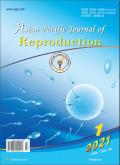应用植入前基因筛查进行辅助生殖技术的夫妇胚胎质量和染色体异常
IF 0.6
Q4 REPRODUCTIVE BIOLOGY
引用次数: 0
摘要
目的:检测辅助生殖技术和着床前遗传学筛查夫妇胚胎中常见的染色体非整倍体变异及其与胚胎质量的可能关系。方法:采用荧光原位杂交技术对62对夫妇的359个胚胎进行13、21、18、X、Y染色体的筛选。对于卵裂球的活检,激光被用来去除明显较小的透明带部分。通过孔用吸液管轻轻活检一个卵裂球。活检后,胚胎立即返回胚胎镜直到移植。第5天评估胚胎完整性和囊胚形成情况。结果:共鉴定62对夫妇282个胚胎。199例(70.57%)胚胎染色体正常,83例(29.43%)胚胎染色体异常。胚胎质量与染色体数目异常无显著相关性(P=0.67)。结论:胚胎质量与其遗传状态无显著相关。因此,通过形态参数来确定胚胎的质量并不是选择没有这些异常的胚胎的合适方法。本文章由计算机程序翻译,如有差异,请以英文原文为准。
Embryo quality and chromosomal abnormality in embryos from couples undergoing assisted reproductive technology using preimplantation genetic screening
Objective: To detect common chromosomal aneuploidy variations in embryos from couples undergoing assisted reproductive technology and preimplantation genetic screening and their possible associations with embryo quality. Methods: In this study, 359 embryos from 62 couples were screened for chromosomes 13, 21, 18, X, and Y by fluorescence insitu hybridization. For biopsy of blastomere, a laser was used to remove a significantly smaller portion of the zona pellucida. One blastomere was gently biopsied by an aspiration pipette through the hole. After biopsy, the embryo was immediately returned to the embryo scope until transfer. Embryo integrity and blastocyst formation were assessed on day 5. Results: Totally, 282 embryos from 62 couples were evaluated. The chromosomes were normal in 199 (70.57%) embryos and abnormal in 83 (29.43%) embryos. There was no significant association between the quality of embryos and numerical chromosomal abnormality (P=0.67). Conclusions: Embryo quality is not significantly correlated with its genetic status. Hence, the quality of embryos determined by morphological parameters is not an appropriate method for choosing embryos without these abnormalities.
求助全文
通过发布文献求助,成功后即可免费获取论文全文。
去求助
来源期刊

Asian Pacific Journal of Reproduction
Veterinary-Veterinary (all)
CiteScore
1.70
自引率
0.00%
发文量
588
审稿时长
9 weeks
期刊介绍:
The journal will cover technical and clinical studies related to health, ethical and social issues in field of Gynecology and Obstetrics. Articles with clinical interest and implications will be given preference.
 求助内容:
求助内容: 应助结果提醒方式:
应助结果提醒方式:


